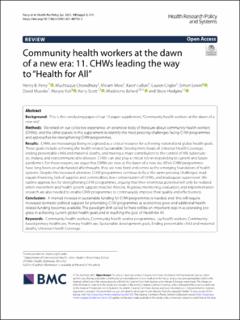| dc.description.abstract | Background: This is the concluding paper of our 11-paper supplement, "Community health workers at the dawn of a new era". Methods: We relied on our collective experience, an extensive body of literature about community health workers (CHWs), and the other papers in this supplement to identify the most pressing challenges facing CHW programmes and approaches for strengthening CHW programmes. Results: CHWs are increasingly being recognized as a critical resource for achieving national and global health goals. These goals include achieving the health-related Sustainable Development Goals of Universal Health Coverage, ending preventable child and maternal deaths, and making a major contribution to the control of HIV, tuberculosis, malaria, and noncommunicable diseases. CHWs can also play a critical role in responding to current and future pandemics. For these reasons, we argue that CHWs are now at the dawn of a new era. While CHW programmes have long been an underfunded afterthought, they are now front and centre as the emerging foundation of health systems. Despite this increased attention, CHW programmes continue to face the same pressing challenges: inadequate financing, lack of supplies and commodities, low compensation of CHWs, and inadequate supervision. We outline approaches for strengthening CHW programmes, arguing that their enormous potential will only be realized when investment and health system support matches rhetoric. Rigorous monitoring, evaluation, and implementation research are also needed to enable CHW programmes to continuously improve their quality and effectiveness. Conclusion: A marked increase in sustainable funding for CHW programmes is needed, and this will require increased domestic political support for prioritizing CHW programmes as economies grow and additional health-related funding becomes available. The paradigm shift called for here will be an important step in accelerating progress in achieving current global health goals and in reaching the goal of Health for All. Keywords: Community health worker programmes; Community health workers; Community-based primary healthcare; Ending preventable child and maternal deaths; Lay health workers; Primary healthcare; Sustainable development goals; Universal Health Coverage. | |
